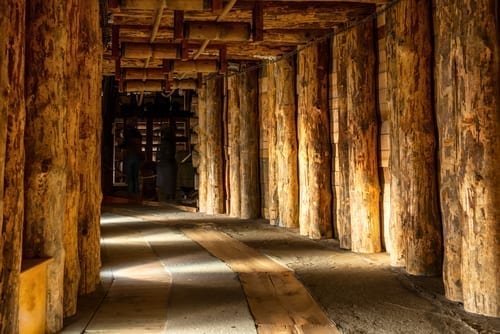
The Torah devotes a great deal of time to Avraham Avinu and Yaakov Avinu and relatively little to Yitzchak Avinu (though Yitzchak lived longer life than either one). Accordingly, it may seem difficult to learn from his life. However, on deeper analysis, the paucity of information about Yitzchak illuminates his mode of serving HaShem and its relevance to our own lives.
The Gemara[i] tells us that the Avos described the Temple in different ways. Avraham called it a mountain; Yitzchak, a field; and Yaakov, a house. The commentaries explain that these descriptions teach us how each of our forefathers related to avodas HaShem.[ii] A mountain incorporates numerous rock formations and rises to great heights, providing a fascinating and diverse view. This image symbolizes the eventful life of Avraham Avinu, who scaled untold heights in teaching the world about monotheism. A house represents one’s daily, mundane life. Yaakov Avinu spent much of his life involved in very mundane activities, such as supporting his family while dealing with tricksters like Lavan. Yet Yaakov succeeded in sanctifying these seemingly unholy pursuits.
In this vein, what is the significance of a field with regard to Yitzchak Avinu? Unlike a mountain, a field does not offer a fascinating view with great variety, and unlike a house, it is not full of a variety of objects. Rather, a field is flat and featureless. Yet it is the subject of intense work aimed at maximizing its yield. Likewise, Yitzchak’s avodas HaShem was characterized by intensive self-growth and self-nullification. Rav Yaakov Kamenetsky, ztz”l, notes that Yitzchak was far less suited to teaching and inspiring the masses than Avraham and Yaakov.[iii] Moreover, he was not involved in physicality as much as Yaakov.[iv] Yitzchak’s niche was self-perfection, striving to nullify his own desires and act solely according to HaShem’s will.
We can now understand why the Torah records so few events in Yitzchak’s life: because there were so few. By its very nature, Yitzchak’s kind of spiritual inner work entails few dramatic episodes. Rather, it involves slow, gradual, and difficult self-development. Yet Yitzchak’s form of avodah is perhaps the most important, for it represents the stage of life that defines one’s spiritual fortitude.
Rav Akiva Tatz, shlita, notes that many aspects of life involve three stages. The first is the inspiration stage, in which a person excitedly begins a certain endeavor or relationship. In the second stage, this inspiration gives way to the realization that this project is not so easy after all. This stage calls for much persistence and hard work, often without seeing results. In the third stage, one’s labors finally bear fruit. The feeling at this stage is far deeper and more satisfying than at the first stage, because one has earned it through his efforts. Marriage is a good example of this phenomenon. At the beginning of a relationship, both people are very excited; they feel they are in love, when in truth they are infatuated. Then the excitement wears off, and the couple must buckle down to hard work and self-development. Only if husband and wife exert the necessary effort will they eventually reach the third stage: genuine, deep love.[v]
The three Avos correspond to these three stages. Avraham represents the exciting beginning, and Yaakov signifies the final phase of perfection. Yitzchak embodies the middle stage, where the excitement has faded and hard work is required.
This pattern is extremely pertinent to all aspects of avodas HaShem. When a person begins a spiritual journey, he feels a great sense of inspiration at the new vistas open to him. But he soon realizes that serving HaShem is very hard work. For example, to become a talmid chacham, a person must go through the excruciating process of mastering Hebrew and Aramaic, then approach the numerous difficulties involved in understanding the Gemara. But after all that effort, when he completes a chunk of learning, he feels truly satisfied. Yitzchak Avinu represents that stage of life that is not necessarily exciting or eventful; rather, it’s backbreaking.
When we view gedolim, we are usually exposed to the great events of their later lives, but they all attained their greatness through years of devoted Torah study and self-growth. One elderly man who learned alongside the great Rav Moshe Feinstein, ztz”l, when they were young was asked to relate stories from Rav Moshe’s time in yeshivah. He answered that there were no stories – all Rav Moshe did in yeshivah was learn! It was that diligence and determination that created a gadol hador.
We have developed a much deeper understanding of the significance of Yitzchak Avinu in our lives. His lessons are relevant regardless of one’s stage in life. Yitzchak teaches us that to achieve greatness in Torah, we must put considerable time and effort into learning and character development. Even later in life, we must find time daily to focus on spiritual development, including Torah study and introspection. May we all emulate Yitzchak Avinu and eventually reap the fruits of hard labor.
Notes and Sources
[i] Pesachim 88a.
[ii] See Ben Yehoyada ad loc.
[iii] Rav Yaakov Kamenetsky, Emes l’Yaakov, Bereishis 25:19, pp. 140–41.
[iv] True, the Torah details Yitzchak’s work as a shepherd amid the Pelishtim, yet it seems that this period of his long life was brief. It is Yaakov who specialized in sanctifying the mundane, whereas Yitzchak is associated with other strengths.
[v] Rabbi Akiva Tatz, Living Inspired (Southfield, Mich.: Targum, 1993).
From the book “Beacons of Light”
